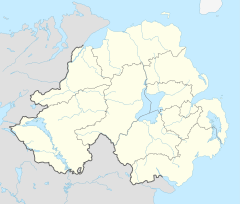Our website is made possible by displaying online advertisements to our visitors.
Please consider supporting us by disabling your ad blocker.
Portadown
| Portadown | |
|---|---|
 St Mark's Church of Ireland in central Portadown | |
Location within Northern Ireland | |
| Population | 32,926 (2021 estimate) |
| Irish grid reference | J008537 |
| • Belfast | 24 mi (39 km) |
| • Dublin | 74 mi (119 km) |
| District | |
| County | |
| Country | Northern Ireland |
| Sovereign state | United Kingdom |
| Post town | CRAIGAVON |
| Postcode district | BT62, BT63 |
| Dialling code | 028 |
| Police | Northern Ireland |
| Fire | Northern Ireland |
| Ambulance | Northern Ireland |
| UK Parliament | |
| NI Assembly | |
Portadown (from Irish Port an Dúnáin 'landing place of the little fort' pronounced [pɔɾˠt̪ˠ ə ˈd̪ˠuːnˠaːnʲ])[3][4] is a town in County Armagh, Northern Ireland. The town is based on the River Bann in the north of the county, about 24 miles (39 km)[5] southwest of Belfast. It is in the Armagh City, Banbridge and Craigavon Borough Council area and had a population of about 32,000 at the 2021 Census. For some purposes, Portadown is treated as part of the "Craigavon Urban Area", alongside Craigavon and Lurgan.
Although Portadown was founded during the early 17th century English Plantation of Ulster, it was not until the Victorian era and the arrival of the railway that it developed as a major town. It earned the nickname "hub of the North" because it was a major railway junction; here the Great Northern Railway's line diverged for Belfast, Dublin, Armagh and Derry. In the 19th and 20th centuries, Portadown was also a major centre for the production of textiles (mainly linen).
Portadown is the site of the long-running Drumcree dispute. Catholics have protested the yearly marches through their part of town by the Protestant Orange Order, who are celebrating the 1690 victory over Catholics by William of Orange at the Battle of the Boyne. Often violence and protests have been sparked by this event. In the 1990s, the dispute escalated and the government responded with a massive security operation, drawing worldwide attention to Portadown.[6]
- ^ "North-South Ministerial Council: 2005 Annual Report in Ulster Scots" (PDF). Retrieved 13 November 2011.
- ^ "History of Moira Station – NI Department of the Environment" (PDF). Retrieved 13 November 2011.
- ^ Room, Adrian. Placenames of the World. McFarland, 2006. p. 300
- ^ Mills, A D. A Dictionary of British Place-Names. Oxford University Press, 2003.
- ^ "How Far Is It Between?". Free Map Tools. Retrieved 13 November 2011.
- ^ Mulholland, Dr. Peter (January 2010), Justice and Policing and Orange Parades: Towards a History of Orange Violence and Corruption in Northern Ireland, pp. 3–7.
Previous Page Next Page



